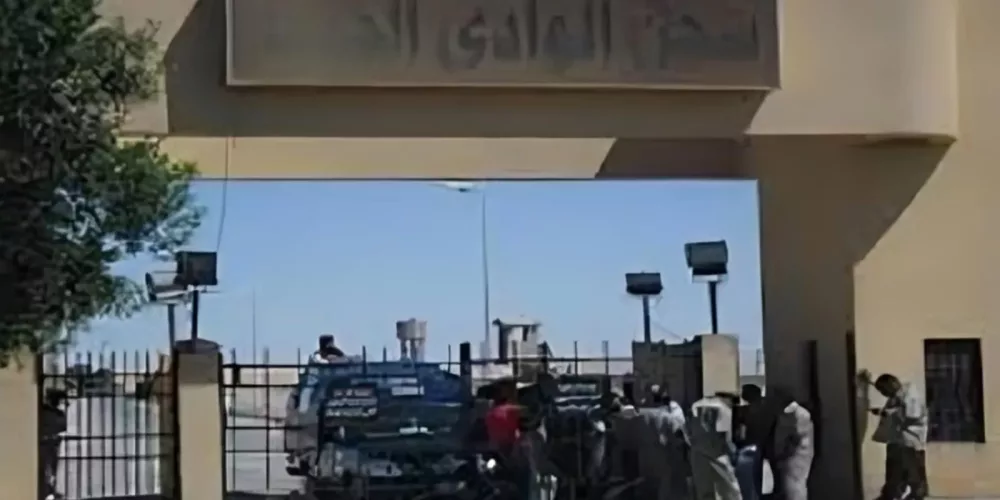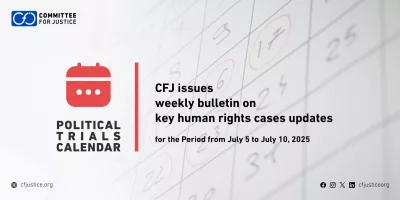The Committee for Justice (CFJ) has stated that the situation of political detainees in Egypt remains a significant concern for human rights advocates. CFJ notes that violations against these detainees have intensified, largely due to the international community’s indifference, prioritizing political and economic interests over human rights in its relations with the Egyptian regime.
This statement followed CFJ’s receipt of a distress letter from political detainees at New Valley Prison, known by various names including Al-Manfaa, Al-Wahat, Al-Mahariq, and Tokar. Located in the heart of the Western Desert, near the village of Al-Sharika in New Valley Governorate, about 630 kilometers from Cairo, the prison is one of Egypt’s oldest and most notorious political detention centers. The letter described severe human rights violations experienced by the detainees.
According to the letter, the suffering of political detainees begins from the moment of their arrival, where they are subjected to a brutal reception process known as “Al-Tashrifa.” During this process, detainees are lined up and beaten with hands, sticks, and electric wires by prison guards and Central Security soldiers for hours until they lose consciousness. Upon regaining consciousness, they find themselves in a disciplinary cell, which is no more than three meters in size, without electricity or water, and consisting of only four walls. Detainees are held in these cells for at least six months, sometimes extending to a year or even several years, as is currently the case with some detainees.
Inside the disciplinary cell, detainees are provided with only one bag of water per day, which holds less than a liter, and a single loaf of bread. This lack of nutrition has turned many political detainees into skeletal figures. Additionally, each detainee is given an empty bag to use as a toilet, as there are no restroom facilities in the disciplinary cells.
After leaving the disciplinary cells, detainees are moved to the “Al-Masfaha” phase, which consists of collective cells about 16 meters in size, also without restrooms or personal hygiene facilities, and overcrowded with 65 or more inmates. The overcrowding and lack of sanitation in these cells lead to outbreaks of scabies and other skin diseases, and detainees are kept there for two to six months.
The next phase involves “Al-Dawayi” cells, which are approximately 24 meters in size and house 30 inmates. While these cells have a restroom, there are no hygiene supplies, and detainees stay there for two to six months before being moved to “housing” cells.
In the “Taskeen” cells, political detainees in New Valley Prison suffer from malnutrition, medical neglect, lack of exercise, and poor conditions during family visits. The prison’s remote location adds to the suffering of the detainees’ families, who also endure mistreatment from prison guards during visits. Visits are conducted through bars, lasting only seven minutes, with detainees shackled from behind in handcuffs.
The detainees’ families have also been subjected to abuse, with one instance involving a National Security officer named Adel physically assaulting the sister of a detainee. In addition, some female visitors have been subjected to invasive body searches, where prison staff forcibly removed their clothing and conducted searches that violated their privacy.
The letter stated that these practices and violations are carried out under the orders and supervision of the prison’s Chief of Investigations, Hossam Al-Dosouki, the prison warden, Suleiman Haidar, and National Security officers Ahmed Yasser and Shihab, along with the aforementioned officer Adel.
CFJ considers the silence on these grave human rights violations within Egyptian detention centers to be unjustifiable and calls for urgent intervention to address this critical issue in Egypt’s human rights landscape. The recent international indifference to this matter has given Egyptian authorities the green light to continue their abuses against political detainees.
CFJ holds the administration of New Valley Prison responsible for the safety of the political detainees, condemns the violations and assaults against them, and affirms its full solidarity with them. The deprivation of their basic human rights is inhumane and illegal, necessitating immediate review. CFJ calls for transparent and urgent investigations into these violations, accountability for those responsible, and prevention of impunity.
CFJ also urges the Egyptian authorities to stop treating political detainees as a security issue and calls for increased international pressure on Egypt to grant UN and human rights organizations—both international and local—access to these facilities to monitor conditions and document abuses. Additionally, CFJ emphasizes the crucial role of the Egyptian judiciary in addressing these violations to halt them and ensure that perpetrators are held accountable. There is also a need for the establishment of an independent UN mechanism to monitor and assess human rights conditions in Egypt, tasked with investigating and reporting on such violations in detention centers.






